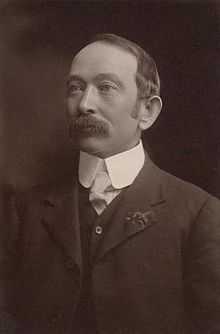Edward Findley
| The Honourable Edward Findley | |
|---|---|
 | |
| Senator for Victoria | |
| In office 1 January 1904 – 30 June 1917 | |
| In office 1 July 1923 – 30 June 1929 | |
| Personal details | |
| Born | 8 September 1864 Bendigo, Victoria |
| Died | 26 October 1947 (aged 83) Caulfield, Victoria |
| Nationality | Australian |
| Political party | Australian Labor Party |
| Spouse(s) | Lilian Foyle |
| Occupation | Journalist |
Edward Findley (8 September 1864 – 26 October 1947) was an Australian politician and publisher.
Findley was born in Bendigo, Victoria (then called Sandhurst) and was apprenticed as a compositor on the Bendigo Independent before moving to Melbourne in the early 1880s to work on the Daily Telegraph, which closed in 1892. He became an active unionist and was elected president of the Australasian Typographical Union in 1897. He established a weekly newspaper, the Boomerang in 1894, but it ran for only eight issues. He helped establish the Toscin, a radical union weekly in 1896.[1]
Political career
Findley was elected as an Australian Labor Party member for the Victorian Legislative Assembly seat of Melbourne in 1900 but was expelled from parliament soon after on 25 June 1901 for seditious libel as editor of the Toscin for republishing a Dublin Irish People article on King Edward VII. He stood at the by-election, but was not re-elected due to the conservative parties limiting the number of their candidates opposing him. He also stood unsuccessfully for the seat in 1902.[1]
Findley won a seat in the Australian Senate at the 1903 election. He was an honorary minister in the second Fisher Ministry from 1911 to 1913 and was responsible in the Senate for matters handled by the Minister of Home Affairs and the Postmaster-General. In 1911, he married Lilian Foyle. He was defeated at the 1917 election, but returned to the Senate at the 1922 election. He was defeated again at the 1928 election.[1]
Findley was a government director of the Commonwealth Oil Refineries Ltd—a government-owned oil retailer, established by Billy Hughes and sold to British Petroleum in 1952—from 1930 until his death. He died in his home in the Melbourne suburb of Caulfield, survived by his wife and one of his two daughters.[1]
Notes
- ↑ 1.0 1.1 1.2 1.3 Marshall, Tony (1981). "Findley, Edward (1864 - 1947)". Australian Dictionary of Biography. Canberra: Australian National University. Retrieved 2008-02-25.